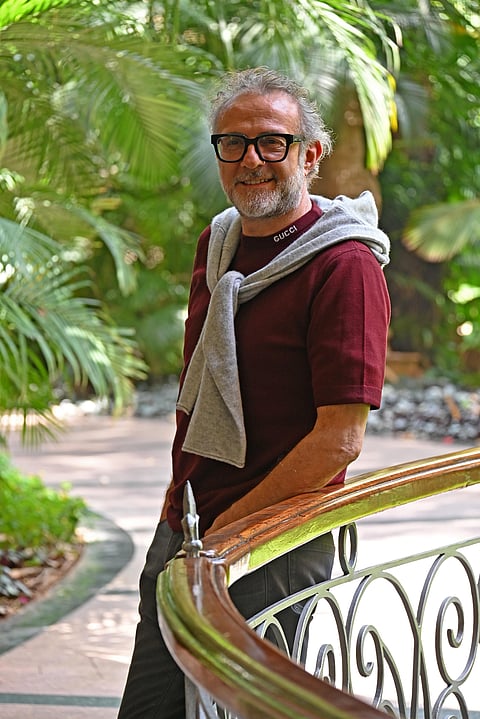

These are all titles that I don’t care about every day. These are not things that influence your life. What I really care about is the future,” says chef Massimo Bottura, who is widely regarded as the ‘best chef in the world’, with his Michelin 3-star restaurant Osteria Francescana in Modena, Italy, having been declared ‘The Best Restaurant in the World’ by The World’s 50 Best Restaurants, once in 2016, and again in 2018. Bottura, a visionary known for revolutionising Italian cuisine by pushing the boundaries of the ‘nonna’ style of cooking (a way of preparing food with simple, classic techniques, often using fresh, seasonal ingredients) explains that his preoccupation is with constant innovation. “Most of the time, people don’t understand what you’re doing and why. Last year’s tasting menu was called Globale with flavours that are part of the Italian market right now. People said ‘this is crazy’ and that I’m ‘contaminating Italian cuisine’ but no, I’m just shaping the future. In 10 years, everyone is going to cook like this,” he asserts.
Visiting the city for the first time recently for a pop-up at The Leela Palace Bengaluru, Bottura brought his signature dishes like Oops I Dropped the Lemon Tart, The Crunchy Part of the Lasagne, and Psychedelic Cod Not Flame Grilled, to an exclusive audience, charging ₹50,000 per meal (excluding alcohol). Speaking to him about food means listening to him connect Picasso’s works to Lou Reed’s music and tie them into an explanation about the source of his creativity. “It’s one of my biggest passions for 45 years and it [art, music, poetry, and cooking] is all part of the same page,” he explains, adding, “Culture helps you open unexpected doors, and then, you keep working and experimenting.”
Bottura’s culinary roots can be traced back to the place Osteria Francescana sits and where he grew up, surrounded by the cooking of his mother and grandmother – Modena. It was here, that Bottura learnt something he prioritises in his work to this day: the value of sustainability and community. “Modena is called the food valley of Italy. It’s where Balsamic vinegar is created, but also parmigiano, prosciutto – all the iconic products of Italy. When your life becomes successful, you learn to give back; our first goal was fighting food waste,” says Bottura, who has been named a Sustainable Development Goal (SDG) advocate by the UN. Recalling a brief conversation with the recently-deceased Pope Francis regarding the same, he shares, “It’s so insane that in 2025, we have to keep fighting [to reduce food waste] and keep trying to raise awareness. Pope Francis was like that too. When we met at the G7 Summit, he said, ‘What about your refettorio (soup kitchen)?’ I told him we had 13 of them and he said, ‘That’s very good, that’s what the world needs – people who think about others.’”
Having visited India, particularly Delhi and Mumbai, when asked how he sees India’s culinary landscape, Bottura confesses it to be the reason why he keeps returning. “India, Mexico and China have always had great cuisines but very nostalgic. Something I noticed after coming back here is that Indian cuisine is now getting more contemporary and culturally open,” he says.
In his time in Bengaluru, Bottura has managed to sample a yele oota. “We spent the evening experiencing a classic dinner on banana leaves, with different elements, eating with our hands. The flavours – from spiciness to sweetness to moving from one preparation to another – were amazing. I really love it because we were playing with the food and moving things around. It is more the ritual of eating together that makes it so memorable,” he says.